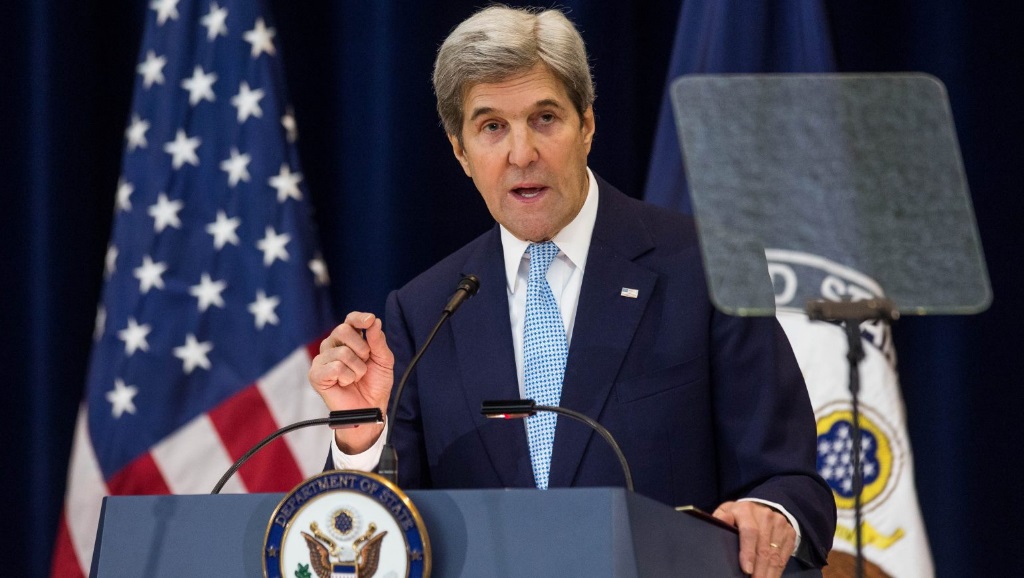
Ken Stein – January 11, 2017
In the aftermath of UNSC Resolution 2334 condemning Israeli settlement construction, Secretary of State John Kerry publicly blamed Israeli settlement construction in the West Bank for being the major barrier to a two-state solution to resolution of the Israeli-Palestinian conflict. Otherwise, optimistic about policies in general during his term as Secretary of State, Kerry struck a particularly blustery and pessimistic tone. “No one,” he said, “thinking seriously about peace can ignore the reality of what the settlements pose to [not achieving] that peace.” One month before leaving office, Kerry was obviously frustrated that he did not succeed in getting Palestinians and Israelis to make progress in negotiating at least a beginning of the end of their conflict. Kerry specifically called for recognizing Israel as a “state for the Jewish people” alongside a “state for the Palestinian people.” Palestinian and other Arabs have historically opposed any recognition of Israel as a Jewish state, lest presently expatriated Palestinians by some future agreement with Israel be excluded forever from living inside Israel’s borders. Hearing Kerry’s request that Israel be recognized as a Jewish state, many Palestinians and Arab commentators opposed Kerry’s call. The Secretary called for Jerusalem to be the internationally recognized capital for two states, the first time the US has publically called for that political outcome.
In response to Kerry’s speech, Israeli PM Netanyahu categorized it as a “big disappointment,” particularly that Kerry chose to lambast Israel in terms of settlement building. Netanyahu stated, “the entire Middle East is going up in flames, entire countries are toppling, terrorism is raging and for an entire hour the Secretary of State attacks the only democracy in the Middle East [Israel]…” In comparison to the UN Security Council Resolution passed five days earlier that was condemnatory of Israel’s building of settlements and of changing the character of East Jerusalem, Kerry was not harsh on Israel, particularly with regard to Jerusalem. In the context of what the Trump administration had said about its intent to move the American embassy to Jerusalem, Kerry’s remarks on Jerusalem suggest that if that is the eventuality, it be done under the auspices of two states being created with Jerusalem as a share capital. There was little doubt that in tone and content, coming in the last official month of the Obama-Netanyahu relationship, it was ending with passionately mutual exasperation.
Ken Stein, 12.29, 2016
Additional analyses of Kerry’s speech may be found in
- Nahum Barnea, “Kerry’s failure, Netanyahu’s liberation,” Y-Net, January 2, 2017,
http://www.ynetnews.com/articles/0,7340,L-4901775,00.html
- Oded Eran and Udi Dekel “Secretary of State Kerry’s Speech on the Israeli-Palestinian Conflict, NSS Insight No. 885, January 2, 2017, http://www.inss.org.il/index.aspx?id=4538&articleid=12750
- Hillel Frisch, “Kerry’s Attack on Israel: A Failed Attempt to Divert Attention from Obama’s Disastrous Foreign Policy,” BESA Center Perspectives Paper No.390, January 2, 2017, https://besacenter.org/perspectives-papers/390-frisch-kerrys-attack-on-israel-a-failed-attempt-to-divert-attention-from-obamas-disastrous-foreign-policy/
- David Makovsky, “Kerry’s Speech: Some Continuity, Some Disconnect,” December 29, 2016 http://www.washingtoninstitute.org/policy-analysis/view/kerrys-speech-some-continuity-some-disconnect;
- Robert Satloff, “New Administration must restore intimacy and common purpose to the bilateral partnership,” January 3, 2016, http://www.washingtoninstitute.org/policy-analysis/view/can-trump-overcome-obamas-israel-failure
For the full text of Kerry’s speech, December 28, 2016
Watch and listen to Kerry’s speech, December 28, 2016
http://www.pri.org/stories/2016-12-28/watch-john-kerrys-speech-middle-east-peace
To compare Kerry’s much less strident tones on the same topic – Palestinian-Israeli negotiations –see his final remarks before the question and answer period at that presentation at the Saban Center, given on December 5, 2015.
